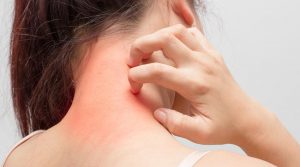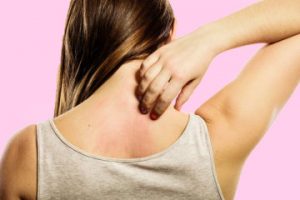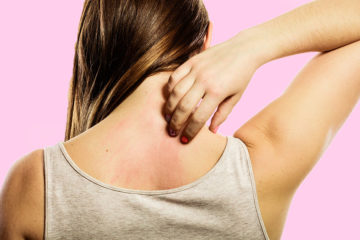Itchy and cracked skin that gets inflamed and red with tiny blisters and little pus oozing out from time to time, all points towards a skin condition called eczema. It comes in many forms, and the appearance and intensity of it differ from person to person.
Eczema can also be sometimes referred to as atopic dermatitis. Though it is a common skin condition in children; adults can have it too.
Most people with eczema, often have some allergies or asthma with red and itchy skin. Although eczema can be treated with the best eczema cream, it is important to learn more about this skin disease.
Let’s check different types of eczema and their symptoms for a better understanding and identification.

Different Types Of Eczema And Their Symptoms
1. Atopic Dermatitis
This is said to be the most common form of eczema that initiates in childhood and fades away with age. Medications and self-care measures can soothe the constant itching and prevent further outbreaks. Usually, those with atopic eczema also suffer from asthma and hay fever.
Symptoms of atopic dermatitis
• Rash in the crease of elbow and knees
• Rash affected skin might get thicker and darker
• Small blisters appear with scratching, fluid leaks at times
• Babies get it on their scalp and cheeks
• Scratching causes infection
This eczema is caused due to dry skin and a weak immune system. It might also be genetic.
2. Contact Dermatitis
Contact dermatitis is the second type of eczema. It is also referred to as contact eczema. This type of eczema usually happens when your skin comes in contact with irritant substances.
Symptoms of contact dermatitis
• Red itchy skin that also stings and burns
• Bumps and blisters on the skin that turn itchy and are filled with fluids that may ooze out.
• Gradual thickening of the skin, hence, making it feel leathery and thick.
Irritant substances like detergent, bleach, certain metals, jewelry, paint, cosmetics, soaps, and perfumes or poison ivy plants cause an allergic reaction and hence this eczema.
3. Dyshidrotic eczema
This eczema forms blisters on hands and feet, and it is a common occurrence in women.
Symptoms of dyshidrotic eczema
• Blisters on fingers, hands, feet, and toes that are fluid-filled
• Itchy blisters that hurt at times
• Flaky, cracking and scaly skin
Keeping hands and feet damp for a long time and susceptibility to allergies can cause this eczema.
4. Hand eczema
As the name suggests, this eczema affects hands due to excessive use of chemicals.
Identify these symptoms –
• Red, itchy and dry hands
• Eczema characterized by blisters and cracks on skin
The more your hand gets exposed to chemicals, the eczema triggers. If you are into hairdressing, cleaning and healthcare jobs, the chances are that you might get this form of eczema.
5. Neurodermatitis
This has the same characteristics as atopic dermatitis and causes thick, scaly patches on the skin.
Symptoms of neurodermatitis
• Thick, dark scaly patches on hands, legs, back of neck, scalp, soles of feet, palms and even genitals.
• They get extremely itchy when in rest like sleeping
• Scratching may lead to bleeding and infection
If you have other types of eczema or psoriasis, subsequently, you might develop Neurodermatitis.
6. Nummular eczema
Nummular eczema is another of the different types of eczema. It is also known as nummular dermatitis or discoid eczema. In this case coin-shaped spots to develop on the skin.
Symptoms of nummular eczema
- round or coin-shaped spots on the skin
- the spots are itchy and become scaly
Nummular eczema can be caused through different ways. A reaction to an insect bite, or by an allergic reaction to metals or chemicals. Having constan dry skin can also cause it.
7. Statis dermatitis
Stasis dermatitis is a chronic skin condition that occurs when fluid leaks out of weakened veins into your skin. The fluid can cause swelling, redness, itching, and pain.
Symptoms of statis dermatitis
- rashes
- darkening of the skin, discoloured and thick skin on legs
- dryness,
- scaly rashes,
- You may even notice varicose veins.
Stasis dermatitis is likely to occur in people who have problems with blood flow in their lower legs. If the valves that normally push blood up through your legs toward your heart malfunction, blood can pool in your legs. This will lead to formation of varicose veins and swelling if the legs.
When to see a doctor?

Eczema is usually a long-term affair, but if the redness and itching increases and it starts interfering with your day-to-day life, it is time to seek medical attention and speak to a dermatologist. The doctor will diagnose the disease condition and prescribe a treatment.
You should also let your doctor know if there are certain triggers to eczema-like food, certain metals, soaps, cosmetics, pollution or even if it triggers after taking a swim in the chlorinated pool.
How to deal with eczema at home the natural way?
Here are a few ways to manage eczema symptoms naturally at home :-
- Cold compress
- Moisturise skin with a good cream
- Avoid rubbing or scratching your skin
- Keep yourself away from the irritants
- Wear gloves if you are handling chemicals
- Add a water softener to remove the harsh minerals in hard water that can dry skin.
The moment you notice any eczema symptoms, visit a dermatologist and get treated. Book an online appointment now!
Author Bio:
Priyanka Singha is an ardent reader and a passionate writer at Zoylo. She keeps herself updated with the trending technology in the healthcare industry through magazines and online journals. A health & wellness writer at her modern enterprise, she has also proved her writing skills in beauty, fashion, and lifestyle at her previous companies. She uses writing as a tool to connect to readers with info on digital healthcare developments and healthy lifestyle options.
ALSO READ:
Mesothelioma: Symptoms, Causes, And Treatments
What Are The Types, Symptoms And Causes Of Hair Loss








